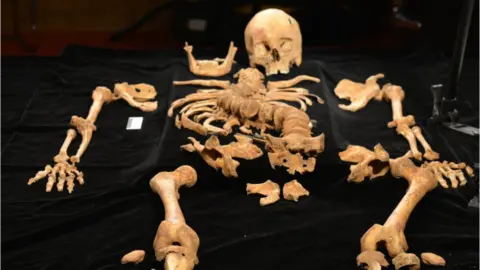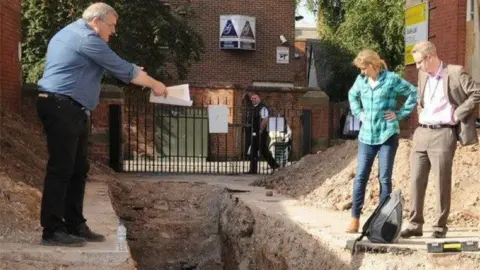Richard III team to get special City of Leicester Award
 BBC
BBCExperts who led the search for the remains of King Richard III are set to receive a top civic award.
Academics involved in the discovery of monarch's bones under a council car park have been nominated for a City of Leicester Award.
The award recognises outstanding performance that has inspired city residents.
The latest recipients are from the University of Leicester team that made the incredible discovery in 2012.
Dr Richard Buckley OBE, Professor Turi King and Professor Emeritus Kevin Schürer have been proposed for the accolade by Leicester City Council.
The council said Dr Buckley's contribution to archaeology, over a 40-year career, had been "immense and raised the public profile of archaeology in Leicester and transformed our understanding of the city's history, particularly through his involvement with the discovery of King Richard III and the subsequent re-interment at Leicester Cathedral".
 Carl Vivian
Carl VivianProf King played key role in identifying the last Plantagenet king's bones through genetic analysis and has carried out a wide range of other pioneering research.
Prof Schürer worked to verify Richard III's present day living relatives who could be used to match DNA.
They included actor Benedict Cumberbatch, who read a poem at Richard III's re-interment, and Conrad Penny whose ancestor William Stanley led the charge that tipped the Battle of Bosworth in favour of the Tudors at the Battle of Bosworth in 1485.
City councillors will vote to approve the awards at a meeting on 29 September.
 University of Leicester
University of LeicesterProfessor Emeritus Ken Pounds CBE will also be recognised.
He kick-started space research in Leicester more than 60 years ago with his work studying X-ray radiation from the Sun and other sources, which revealed one of the first known black holes.
He also proposed the initial idea of a space centre as a research facility with public access in Leicester in the 1980s, which later became the National Space Centre.
In a report, the council said: "Through their educational, historic and scientific endeavour [the academics] have achieved significant improvement in their fields, major cultural impact and greater understanding which has been recognised both within the city, nationally and internationally.
"They have been involved in some of the most major historic and scientific discoveries and are widely recognised and acknowledged both locally and nationally for promoting the city and its institutions in a very positive light.
"They each rightly deserve to be recognised for this through the conferment of the City of Leicester Award."

Follow BBC East Midlands on Facebook, Twitter, or Instagram. Send your story ideas to [email protected].
